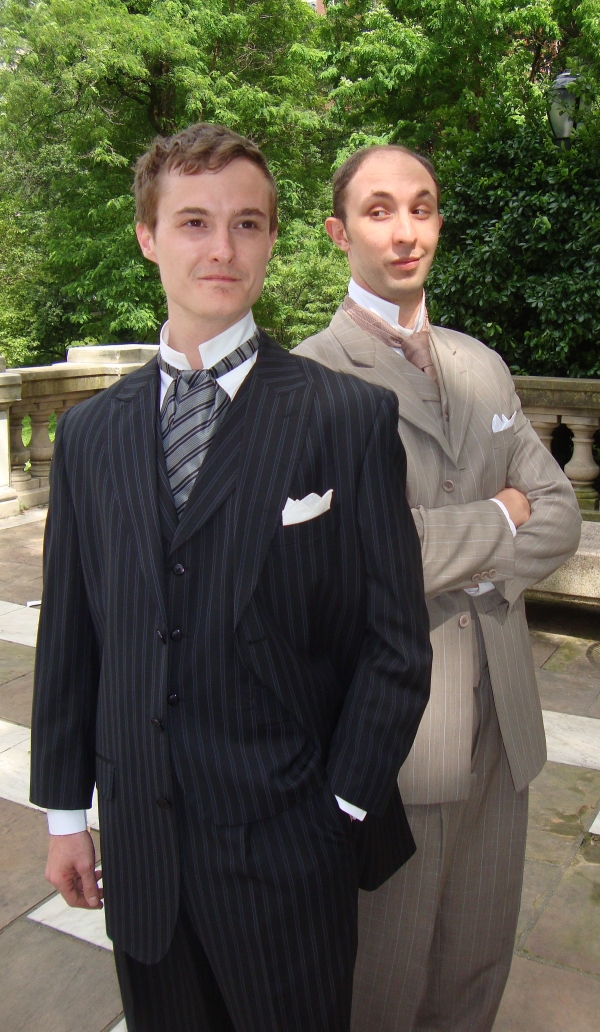The Importance of Being Earnest
Hudson Warehouse presents two hours with the wit of Oscar Wilde on a beautiful patio in Riverside Park.

(Courtesy of Hudson Warehouse)
"I don't think that you should tell me that you love me wildly, passionately, devotedly, hopelessly. Hopelessly doesn't seem to make much sense, does it," Cecily responds to Ernest (who is actually Algernon) as he confesses his love for her in Oscar Wilde's The Importance of Being Earnest, which is now getting a revival from Hudson Warehouse at the Soldiers and Sailors Monument in Riverside Park. This kind of meta-theatrical attention to diction is something you might expect from a postmodern playwright like Will Eno, who employed similar self-awareness in the recently closed Broadway run of The Realistic Joneses.
Of course, as the Victorian Era's premiere literary man about town (who predated Eno by over a century), Wilde used his plays as thinly veiled excuses to share his witty observations about art and London society with a large audience. "The truth is rarely pure and never simple. Modern life would be very tedious if it were either, and modern literature a complete impossibility," opines Algernon (Jonathan William Minton) in one of his countless pithy statements, undoubtedly first uttered by Wilde at a fashionable party. Only occasionally does Wilde's simple plot of mistaken identities rudely interrupt such divine turns of phrase.
John (or "Jack") Worthing (George K. Wells) is an English gentleman who is in love with, and wishes to marry, Gwendolen Fairfax (Amber Bogdewiecz), the daughter of Lord Bracknell. Unfortunately, Gwendolen knows him only by his London alias, Ernest. "I pity any woman who is married to a man called John," says Gwendolen in a stunning display of misplaced marital priorities. Her mother, Lady Bracknell (Linus Gelber), has far more conventional priorities: She initiates a brazen inquiry of Worthing's capital assets ("In land, or in investments?") that would make even Thomas Piketty blush.
While his finances are "satisfactory" to Bracknell, his lack of family history is not: As an infant, he was discovered by a wealthy gentleman in a handbag in Victoria Station. Consequently, he doesn't know his own name or family history. Lady Bracknell does not approve: "To be born, or at any rate, bred in a hand-bag, whether it had handles or not, seems to me to display a contempt for the ordinary decencies of family life that remind one of the worst excesses of the French Revolution."
Complicating matters further, Worthing has a young ward named Cecily (Patrina Caruana) living in his country home. His mischievous friend, Algernon, schemes to pose as Jack's wicked brother Ernest in an effort to win Cecily's heart. Of course, she instantly falls for him. With both women hell-bent on marrying an Ernest, the importance of being one becomes tantamount.
Just as Brian Bedford did in the last Broadway revival of Earnest, Gelber portrays Lady Bracknell in full Victorian old lady drag, complete with a heavy dress and ruffled dickey that could double as window dressing. His delivery is singsong and sweet, coloring Bracknell's epigrammatic wit with wretched sincerity. It still works as a ridiculous caricature of the English upper crust, but if you're looking for an acid-tongued aristocrat à la Dowager Countess Maggie Smith, you'll be disappointed.
Minton has a far drier take on Wilde's language, and the wit seems to fall off his tongue with the greatest of ease. With a roll of the eyes and an incredulous sigh, Bogdewiecz plays Gwendolen like a Victorian Valley girl, to hilarious effect. Bob Wasinger gives us a running commentary with his expressions, playing two normally thankless roles (the butlers Merriman and Lane) with memorable gusto.
Emily Rose Parman's costumes are incredible works of art. Gwendolen wouldn't look out of place on a runway in Paris. The men have perfectly tailored jackets. Justin Graziani's sound design is less appealing: About half of the actors wear microphones, while the other half (the ones who can project) do not. The electronic sound of those who do is noticeable and distracting.
Of course, the language is the real star of any Wilde play. Considering the challenge of producing theater outdoors in one of the noisiest cities on earth, director Nicholas Martin-Smith made the right call in amplifying the quieter actors rather than forcing the audience members to ask their neighbors, "What did she say?"
Electronic static or not, you still get to hear some of Wilde's best lines masterfully delivered in a beautiful setting. This brisk two-hour production seems to leave nothing out and you'll walk away chuckling. That's more than worth the price of admission…which is zero.











